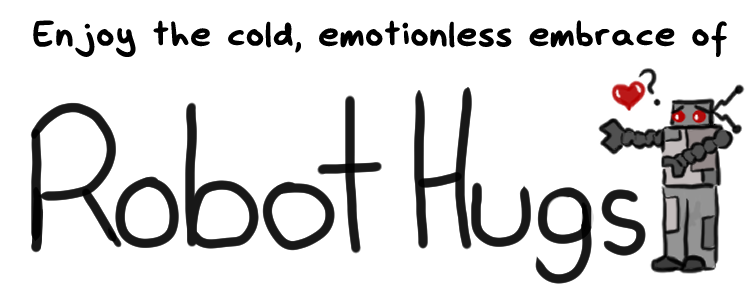
Panel 1
(standing in front of an advertisement for Manly Soap)
Robot Hugs (RH): Hey, you know what's weirdly gendered?
Person 1: Everything?
RH: Well, yeah. But today I'm talking about emotions.
Panel 2
RH: Emotions are basic, natural, uncontrollable, human things. We all feel. We may express how we are feeling differently, but we feel nonetheless.
Panel 3
(RH looking through a magnifying glass that has the male and female symbols around it's frame)
RH: But there's a gendered lens through which the expression of emotion is permitted. For example...
Panel 4
Angry
"That incompetent asshole screwed up again!! Fuck!"
(symbol for male) Angry
(symbol for female ) Crazy (acceptable: frustrated, non-confrontational and undirected towards people)
Panel 5
Sad
"This is so hard.I can't stop crying"
(symbol for male) Pathetic/Embarrassing (acceptable: single manly tear)
(symbol for female) Emotional
Panel 6
Fear
"I'm scared. I don't think I can do this"
(symbol for male) Weak (acceptable: stoicism, assertiveness)
(symbol for female) Vulnerable
Panel 7
Confidence
'We need to get this done tomorrow'
(symbol for male) Leader
(symbol for female) Bitch (acceptable: competent but accommodating)
Panel 8
These gendered stereotypes are also used as tools to invalidate trans identities
Woman 1: As a trans woman, when I get mad, people insinuate that I'm acting like a man...
Panel 9
And there's a racial lens here as well, when expressing emotions is used to discredit or ignore people because of racial stereotypes:
Woman 2: I have to moderate how I present issues I'm passionate about so I don't get dismissed as an 'angry black woman'.
Panel 10
Emotional policing is one of the ways that gendered stereotypes and patriarchy hurt men as well as women.
Man 1: As a man, I get a lot of messages about how I have to be the leader, the actor, the conflict, and the conflict resolver. It doesn't give me a lot of room for me to talk about feeling uncertain, or scared, or weak, or depressed.
Panel 11
Unsurprisingly, emotions that are risky for men to express are ones that are associated with femininity:
Pain:
Man 2: Pull yourself together, you're acting like a little bitch.
(bitch is crossed out and replaced with 'woman')
Fear:
Man 3: Stop being such as pussy!
(pussy is crossed out and replaced with 'woman')
Joy:
Woman 3: It was kind of embarrassing, he cried like a little girl.
(little girl is crossed out and replaced with 'woman')
Panel 12
The math:
Woman-things are bad, (female symbol equals 'bad')
so men shouldn't act like women (male symbol with 'not equal' woman symbol)
Women are emotional (woman crying), therefore men shouldn't be emotional (male symbol with 'not equals' crying)
Panel 13
While there are (often limited and problematic) ways for women to emulate stereotypically 'masculine' qualities:
Strong female protagonist (woman in a superhero outfit)
Just one of the guys (Woman holding a beer)
Professional and competent businesswoman (woman in a business suit)
Panel 14
RH: There aren't a lot of accessible and positive examples of men having the ability to express a full range of human emotions, with one exception: Anger.
Panel 15
In media, positive portrayals of male protagonists often resolve their problems physically:
(posters for Die Hard, Wolverine, Taken, Punisher)
Panel 16
RH:
Panel 17
Loss
(arrow towards 'cry', crossed out with 'weak' written under it. Arrow towards 'talk to someone' crossed out with 'weak' written under it, arrow towards 'Anger' with 'strong' written under it)
Panel 18
When men are discouraged from expressing emotions, they are also discouraged from seeking help for those emotions, making mental health and support resources difficult to access.
Man 4: I was taught to 'pull myself together'. I was never taught how to call for help.
Panel 19
RH: Part of the effort of feminism to make the world safer for all genders, including men, is de-gendering normal human experiences, and destigmatizing things associated with femininity.
Panel 20
So let's write men who cry and women who fight and genderqueer people who complain and boys who get giddy and girls who are proud.
Fuck Boy's don't cry.
Fuck Don't be bossy
Fuck Grow some balls
Fuck Calm down
Panel 21
And support people around you by recognizing and reflecting emotions.
Man 5: Man, you must be devastated, do you need to talk?
Man 6: Holy shit, that would make me furious. How are you feeling now?
Woman 7: It's ok to be scared.
Panel 22
When we are free to express and talk about emotions without having to fear compromising our identities, we create space for individuals and communities to be healthier and safer.
Panel 23
RH: I know I'd feel pretty good about that.
Man 1: Wouldn't you?





